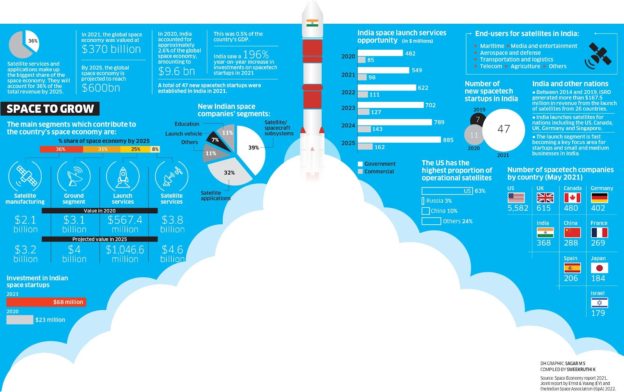The Central government approved the Indian Space Policy (ISP) 2023 on Thursday. The ISP will throw much clarity on the regulatory framework which concerns the diverse activities for space industries which range from remote sensing to deep-space exploration.
The Central government approved the Indian Space Policy (ISP) 2023 on Thursday. This new space policy seeks to regulate and boost private sector participation in the space sector. The ISP also looks to increase investments in the space sector from private companies.
The union minister Jitendra Singh said, “In brief, the Indian Space Policy will offer clarity in the role of the components set up (in the past).”
The Policy thrust on privatization will enable the space sector to be more innovative and sustainable. It is crucial if India wants to be competitive in global space ecosystems. The space sector has remained within the confines of Indian Space Research Organization (ISRO) with full budgetary support from the government.
Despite leading in complex space tech and launch vehicles, the Indian space market is worth $7 billion, which is just about 2% of the global space market.
The entry of the private sector in the space sector would enable the ISRO to channelise its focus on research and development of advanced space technologies.
The Indian Space Policy was approved by the Cabinet Committee on Security chaired by Prime Minister Narendra Modi.
Lt. Gen. AK Bhatt (retd.), Director General, Indian Space Association said “This is a historic moment as the cabinet today approved the Indian Space Policy 2023. It will pave the way forward with much-required clarity in space reforms and augment private industry participation to drive the space economy opportunity for the country.”
The promising space policy 2023
Fundamentally, through the ISP, the government aims to drive the overall growth of Indian commercial space activities by creating a regulatory environment in compliance with international law and by addressing the previous hurdles to the goal of encouraging the private sector.
By institutionalizing the sector, the ISP breaks the monopoly ISRO-driven space sector.
Notably, the ISP also addresses the liability issue in case of any fallout or destruction of space assets. Since India is a party to the Outer Space Treaty, the Liability Convention, and the Registration Convention, the responsibility for any destruction or damage lies with the government.
Within the policy framework, the government aimed to address the crucial issue of the control and access of the dual-use space technology or IP that protects or threatens national security. Industry demanded that IP must be examined on a case-by-case basis.
The Policy will throw much clarity on the regulatory framework which concerns the diverse activities which range from remote sensing to deep-space exploration.
The policy also directs and provides the greater opportunity, more time and resources to focus on deep-space scientific and technological research.
“We have been waiting for it for quite some time and today’s announcement has come as a pleasant surprise. We keenly await and look forward to going through the details of the policy. We would like to thank Prime Minister for his visionary leadership with a special focus on long-due reforms in the Indian space sector.”
https://www.financialexpress.com/business/defence-indian-space-policy-2023-takes-off-a-new-era-of-space-tech-for-private-industries-3037906/





